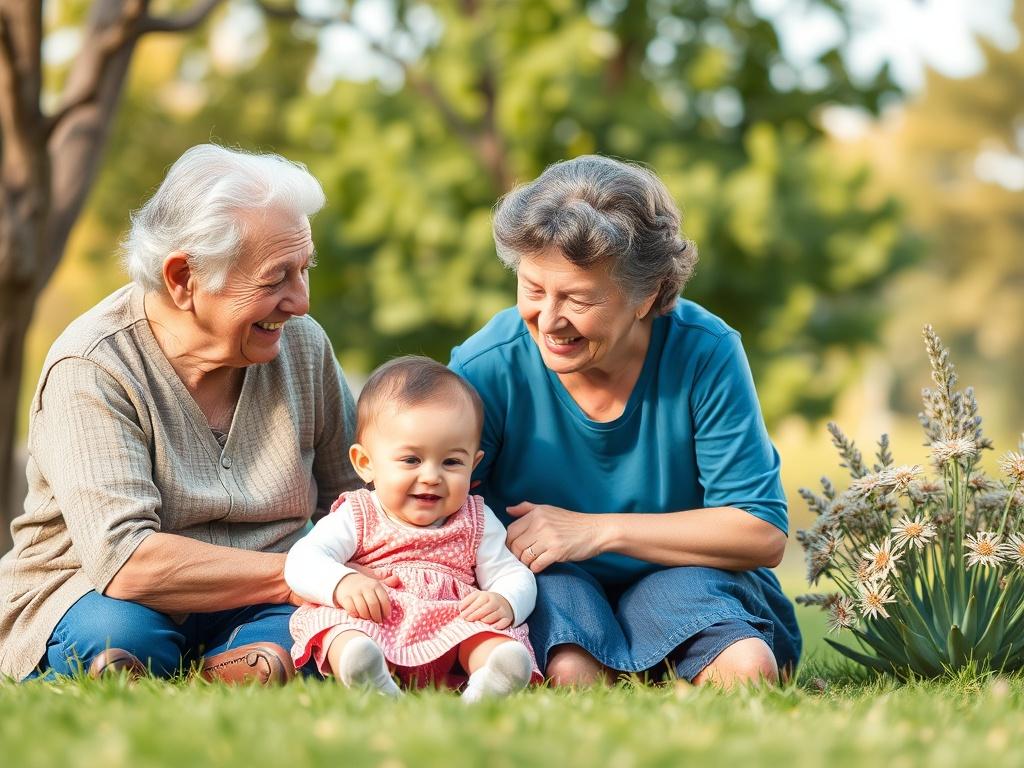SQLITE NOT INSTALLED
When we think about the key influences in a child’s life, parents often come to mind first. However, there is a unique and profoundly important role that grandparents play in child upbringing—one that enriches a child’s world with love, wisdom, and stability. Across cultures and generations, grandparents have been pillars of family support, offering guidance, nurturing, and sometimes even stepping in as caregivers. Their involvement can shape a child’s personality, emotional well-being, and social development in ways that often go overlooked.
In today’s fast-paced world, where family structures are constantly evolving, grandparents’ contributions to raising children have become even more significant. Whether offering a listening ear, sharing family traditions, or providing practical help to busy parents, grandparents bring a special element of continuity and warmth that helps children thrive. Let’s dive deep into the many facets of the role of grandparents in child upbringing, exploring their influence, benefits, challenges, and how modern families can nurture this invaluable relationship.
Understanding the Unique Connection Between Grandparents and Grandchildren
Before we explore the specific ways grandparents contribute to child upbringing, it is important to understand what makes their relationship with grandchildren so special. Unlike parents, whose role often involves discipline, routine responsibility, and daily care, grandparents usually engage with grandchildren in a different way. They tend to embody a more relaxed, patient, and indulgent approach, providing a safe space for children to explore, ask questions, and express themselves freely.
Grandparents often possess a wealth of life experience. This experience extends beyond what textbooks or schools offer, encompassing storytelling, family history, and practical wisdom. In many families, grandparents act as living links to the past—sharing stories of ancestors, traditions, and cultural practices that children might otherwise never learn. This heritage fosters a strong sense of identity and belonging, which is crucial for a child’s psychological development.
Moreover, grandparents frequently offer a level of unconditional love and emotional support that reinforces a child’s self-esteem and emotional resilience. For example, a child overwhelmed by schoolwork or social pressures might find comfort in a grandparent’s understanding presence or encouraging words. This nurturing support builds confidence and helps children learn how to navigate the complexities of growing up.
The Psychological Impact of Grandparents on Children
From a psychological perspective, the involvement of grandparents in child upbringing greatly benefits emotional regulation and coping skills. Numerous studies have demonstrated that children with active grandparent relationships show better emotional health, more empathy, and stronger social bonds. This can be attributed to the secure and non-judgmental environment grandparents often create.
For instance, when children face setbacks or family challenges, grandparents can serve as stabilizing forces. Their ability to listen without immediate criticism helps children develop problem-solving abilities and resilience. This is especially important in blended families or situations with parental stress, where grandparents can provide a semblance of stability and unconditional acceptance.
The Many Roles Grandparents Play in Child Upbringing

Grandparents’ contributions to child upbringing extend beyond babysitting or occasional visits. Their roles are multi-dimensional and vary depending on family circumstances, cultural norms, and individual abilities. Below is a detailed overview of the key roles grandparents often fulfill:
| Role | Description | Benefits to Children and Families |
|---|---|---|
| Caregiver and Babysitter | Providing daily or occasional childcare support, especially when parents are busy or working. | Relieves parental stress, ensures child supervision, and fosters close bonds through extended interaction. |
| Emotional Support Provider | Offering comfort, encouragement, and understanding during times of stress or difficulty. | Enhances children’s emotional well-being, promotes resilience, and helps develop self-confidence. |
| Storyteller and Cultural Keeper | Passing down family histories, traditions, and cultural values through stories and activities. | Strengthens children’s sense of identity, belonging, and cultural awareness. |
| Advisor and Mentor | Providing guidance based on life experiences, including advice on education, relationships, and values. | Helps children make better decisions and prepares them for real-world challenges. |
| Role Model | Demonstrating positive behaviors, ethics, and habits, including kindness, responsibility, and patience. | Shapes children’s character and social behavior through example. |
How Grandparents Help with Practical Child Upbringing Tasks
In many households, grandparents play a crucial role in everyday tasks that contribute to the child’s upbringing. Whether it’s preparing meals, helping with homework, or transporting children to activities, their involvement can ease the daily burden on parents substantially. This practical support not only helps the family run smoothly but also deepens the relationship between grandparents and grandchildren.
Furthermore, grandparents often bring a kind of patience and calmness that allows children to learn at their own pace. While parents may sometimes feel pressured by schedules and responsibilities, grandparents tend to have more flexibility in spending relaxed, quality time with children. This unhurried environment nurtures curiosity and creativity, essential elements for healthy child development.
The Benefits of Grandparent Involvement in Child Upbringing

The influence of grandparents in child upbringing offers numerous tangible and intangible benefits for children, parents, and the family unit as a whole. Understanding these benefits can highlight why fostering these relationships should be a priority in modern family life.
1. Enhancing Children’s Social Skills and Emotional Intelligence
Grandparents often model behavior that teaches children empathy, patience, and cooperation. Children who interact regularly with grandparents tend to develop stronger social skills and emotional intelligence. This impact comes not only from direct interaction but also from the stories and advice grandparents share—many of which include lessons about kindness, resilience, and understanding others’ perspectives.
2. Strengthening Family Bonds Across Generations
A child who grows up knowing and loving their grandparents usually feels a deeper connection to their family history. These intergenerational bonds provide a sense of security and continuity, especially in times of change or hardship. Grandparents serve as anchors linking present and past, which can stabilize children’s identity and foster a lifelong appreciation for family.
3. Supporting Working Parents and Busy Families
In today’s world, many parents balance demanding jobs, household duties, and childcare with little assistance. Grandparents can alleviate these pressures by offering reliable caregiving or simply being a trusted safe haven. This support allows parents to maintain better work-life balance, which ultimately benefits the whole family.
4. Offering Unique Educational Opportunities
Grandparents often provide different educational experiences than parents or schools. Whether teaching a child how to cook, garden, or understand family heritage, they create valuable learning moments that nurture practical skills and cultural knowledge. These experiences enrich a child’s education in ways textbooks cannot.
Challenges and Considerations in Grandparent-Grandchild Relationships
While the role of grandparents is invaluable, it comes with its own set of challenges. Understanding and addressing these challenges helps families maximize the positive impact grandparents can have on child upbringing.
Balancing Authority and Affection
Grandparents often enjoy a more indulgent and permissive role compared to parents, which can sometimes create tension over discipline or household rules. Finding a balance between offering love and supporting parental authority is essential. Open communication between parents and grandparents can help establish clear boundaries and mutual respect.
Health and Mobility Limitations
As grandparents age, physical limitations may affect the degree of active involvement they can maintain. Some may wish to do more but face health constraints. Families should be sensitive to these limitations and focus on the quality of interaction rather than quantity.
Generational and Cultural Differences
Different generational values and cultural beliefs can sometimes cause misunderstandings about child-rearing practices. It is important to approach these differences with empathy and open dialogue, ensuring that grandparents contribute positively without conflicting with the parents’ choices.
How to Foster Strong Grandparent-Grandchild Relationships
Building and maintaining a healthy, loving bond between grandparents and grandchildren requires intention and effort from all family members. Here are some practical tips for nurturing these relationships:
- Encourage Regular Visits and Communication: Frequent face-to-face or virtual interactions help keep the relationship alive and meaningful.
- Include Grandparents in Family Activities: Invite them to celebrations, outings, and routines to reinforce their role in the child’s life.
- Respect Parental Boundaries and Styles: Grandparents should align with parents on key issues, ensuring consistency for the child.
- Share Stories and Traditions: Create special moments where grandparents can teach family history and cultural practices.
- Promote Mutual Respect and Patience: Encourage grandchildren to appreciate their grandparents’ life experiences and grandparents to honor the child’s individuality.
Modern Technology: Bridging the Distance Between Generations
In many families, especially those separated by geography, technology plays a crucial role in maintaining the grandparent-grandchild bond. Video calls, photo sharing, and interactive apps have made it possible for grandparents to be actively involved, even from a distance. These tools help grandparents feel connected to their grandchildren’s lives and provide comfort and support when physical visits are not possible.
Conclusion: Embracing the Enduring Impact of Grandparents in Child Upbringing

The role of grandparents in child upbringing is a timeless and invaluable component of family life. Their unique blend of love, wisdom, and support creates a nurturing environment where children can grow emotionally, socially, and intellectually. By enhancing family bonds across generations, easing parental burdens, and enriching children’s lives with cultural heritage and life lessons, grandparents make a difference that lasts a lifetime.
In a world that often moves too fast, taking the time to recognize and appreciate the role of grandparents can bring enormous benefits not only to children and parents but to the entire family. After all, grandparents hold a special place in the heart of child upbringing — a role full of joy, learning, and an enduring legacy that shapes future generations.
